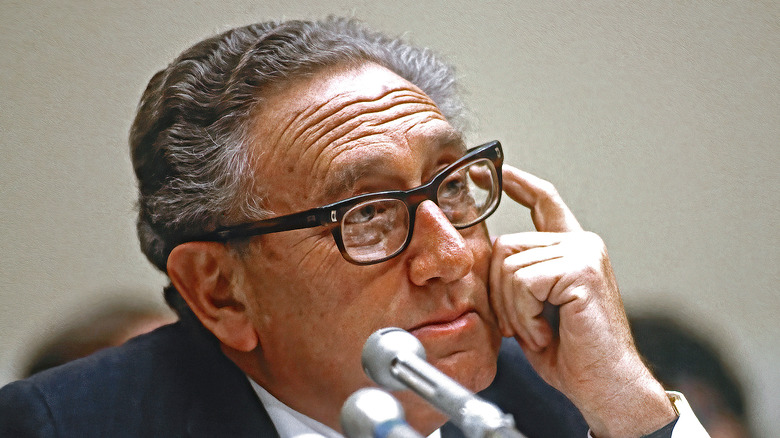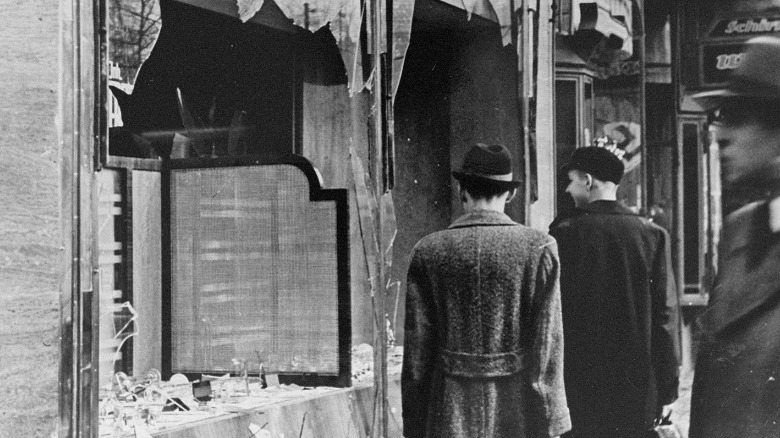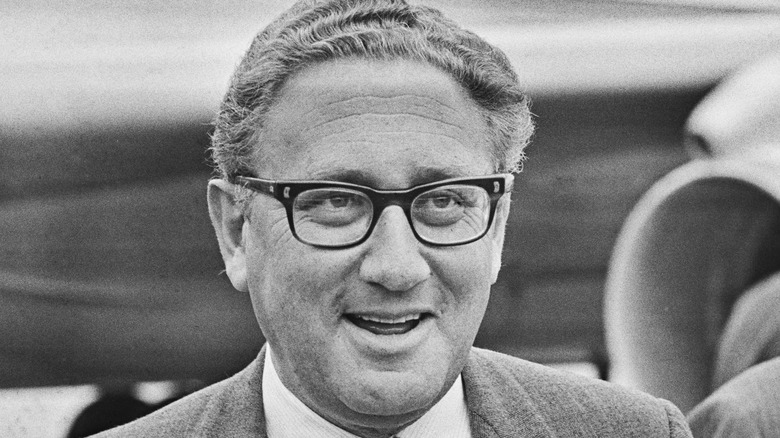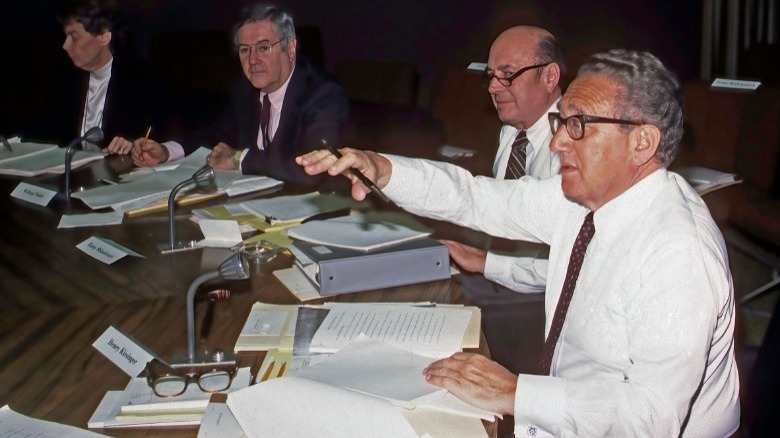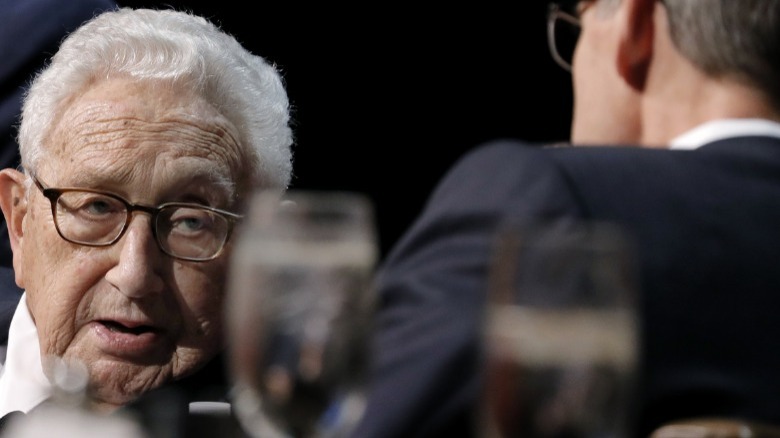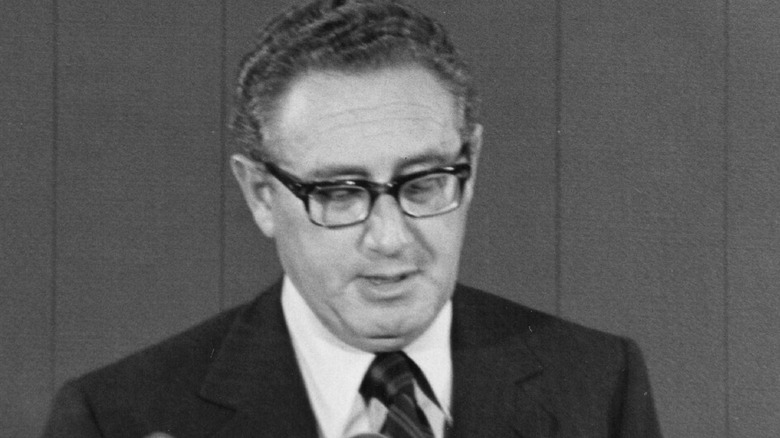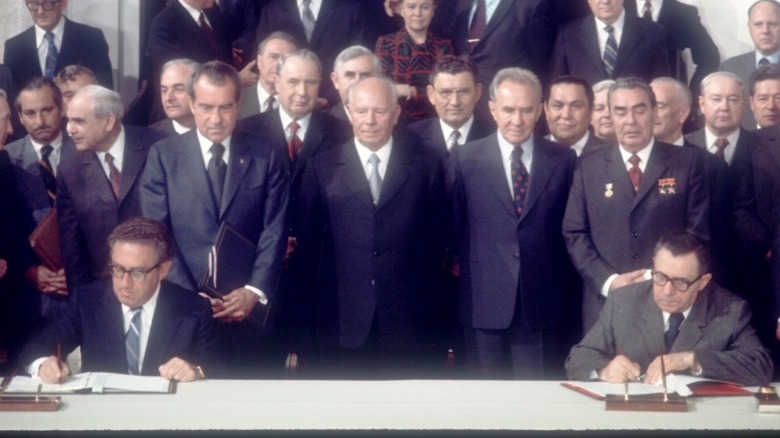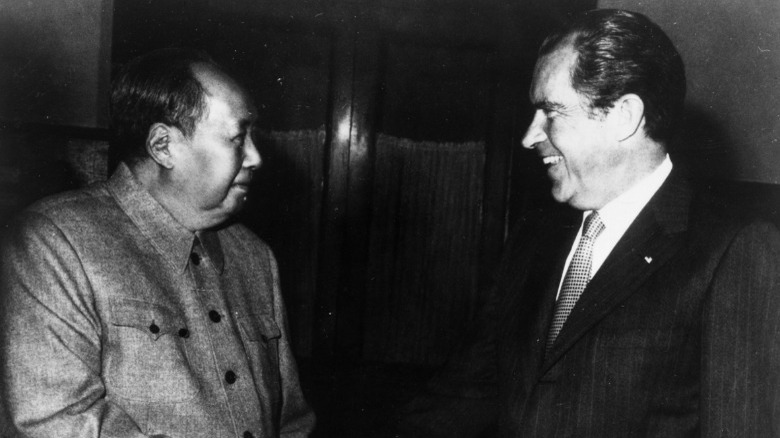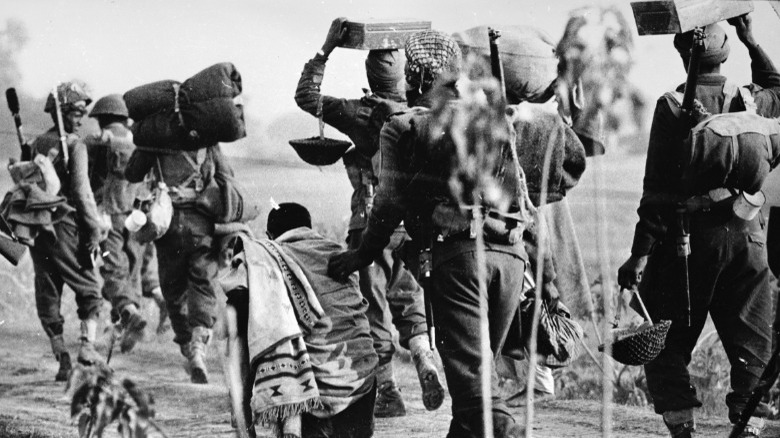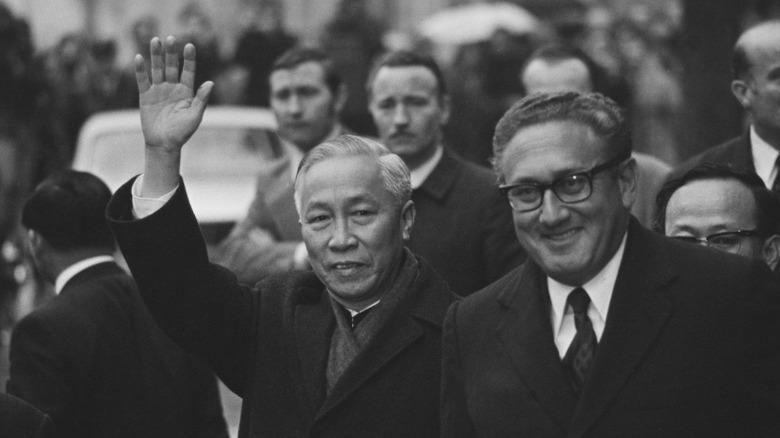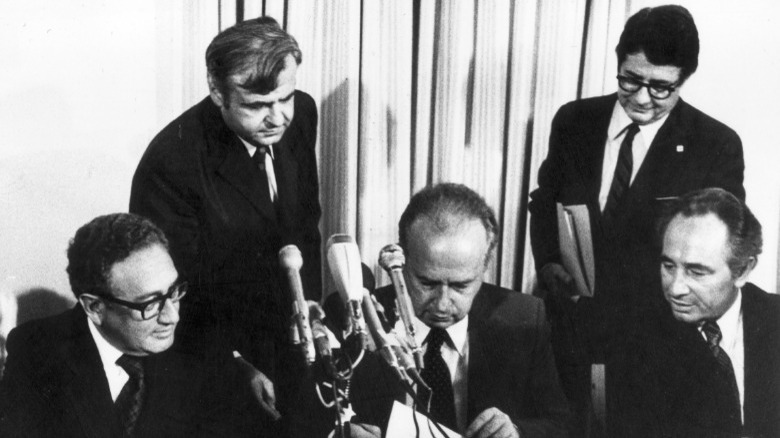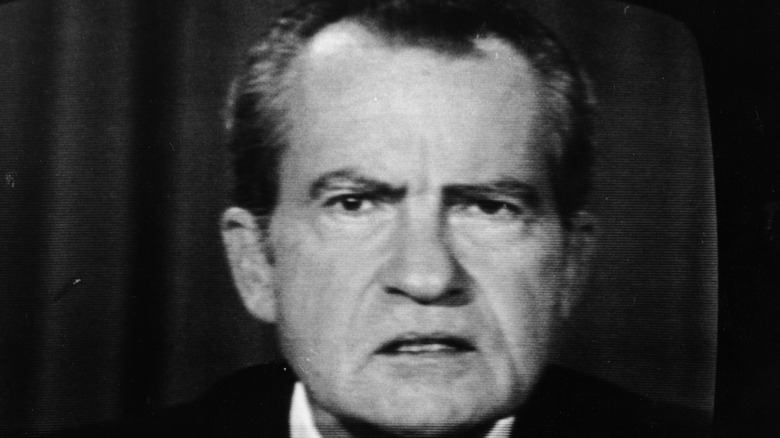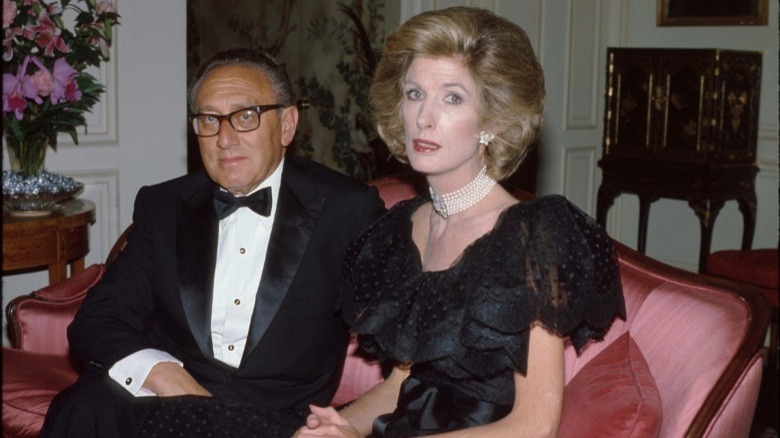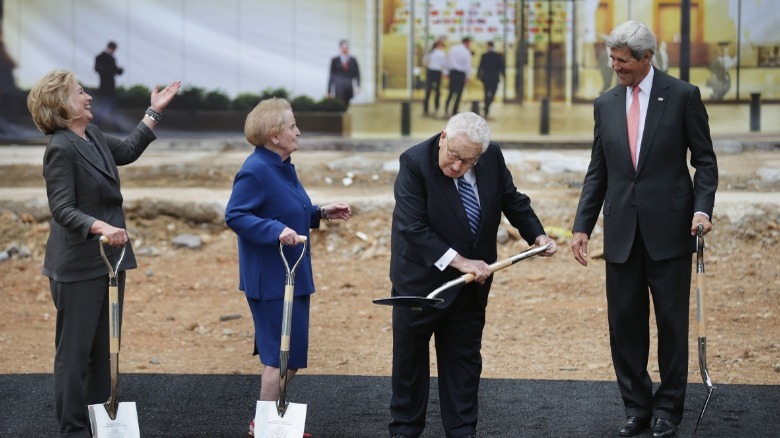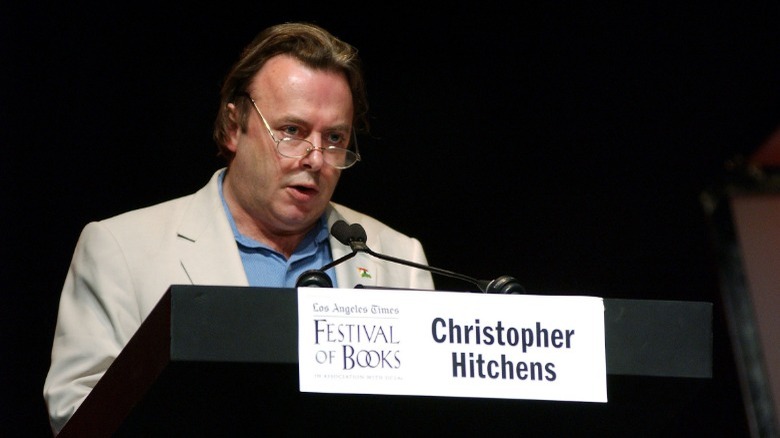The Untold Truth Of Henry Kissinger
Henry Kissinger was United States secretary of state from 1973 to 1977, serving under presidents Richard Nixon and Gerald Ford. He became famous for shaping policy in Vietnam, the Middle East, and especially China, paving the way for Nixon to establish relations with the country in 1972, according to Britannica.
In some ways, Kissinger's life is an aspirational immigrant story. A case of the American Dream in which a foreign-born boy reached the heights of American society through intelligence and hard work. Yet the German native — who passed away November 29, 2023, at age 100 — has left a very contentious legacy.
A survey of U.S. scholars ranked Kissinger as the most effective secretary of state in the last 50 years. Hillary Clinton called him "a friend." Yet many critics, including Bernie Sanders and Christopher Hitchens, described Kissinger in very harsh terms, with Hitchens calling for him to be tried as a war criminal, according to Vox.
Here is the untold truth of Henry Kissinger.
Henry Kissinger's family fled the Nazis
Henry Kissinger was born Heinz Kissinger on May 27, 1923. He spent his early childhood in Furth, a city on the outskirts of Nuremberg, the second largest city in Bavaria, according to WorldAtlas. Kissinger was the son of Louis and Paula Kissinger, a Jewish couple whom the Irish Times described as "profoundly religious."
In November 1923, Adolf Hitler's emergent Nazi party staged the Beer Hall Putsch in a failed attempt to overthrow the Bavarian government. Ten years later, Hitler would be chancellor, turning Germany into a oppressive dictatorship that reserved particular animus for the nation's Jewish population. Kissinger's family was among the many that fled the country, leaving Furth in 1938.
Fortunately, the Kissingers left Germany before Kristallnacht, which occurred on November 9-10 of that year. Also known as the Night of Broken Glass, Kristallnacht was a pogram against Jewish people and property, resulting in the deaths of 91 people, the looting of 7,500 Jewish businesses, and the vandalism of some 1,000 synagogues, according to Britannica.
Kissinger arrived in the U.S. aged 15, settling in New York's Washington Heights, which had so many German immigrants that it was sometimes referred to as the "Fourth Reich," according to The New Yorker. During these early years, Kissinger worked in a factory making shaving brushes and planned on becoming an accountant.
He fought against the Nazis as an intelligence officer
According to The New Yorker, Henry Kissinger was drafted into the U.S. Army in 1942. He relished the role so much that a compatriot observed, "He was more American than I have ever seen any American." Historian Jeremi Suri notes how he was recruited for this role because he spoke German, had cultural knowledge of Germany, and was of Jewish heritage, which gave the Americans confidence that he would be anti-Nazi. Serving in 84th infantry division, Kissinger was awarded a Bronze Star for his help in breaking up a Gestapo sleeper cell.
It was during his military experience that Kissinger met Fritz Kraemer, a fellow German-American some 15 years older than him. Kraemer was an intense man who had animosity for both Communists and Nazis, with whom he apparently fought in the streets of Weimar Germany. Kraemer's "Nietzschean" perspective on the world caused Kissinger to describe him as, "the greatest single influence on my formative years." However, according to Globalo, Kraemer cut ties with Kissinger in the 1970s because he was "visibly repulsed by Kissinger's egotism and vanity."
The Guardian reported that Fritz Kraemer died on September 8, 2003.
He subscribed to the realpolitik worldview
Henry Kissinger has been cited by many, including Foreign Affairs, as a 20th century figure of "realpolitik." Jeremi Suri describes realpolitik as "focusing on the power centers in the world and ... manipulate those power centers to serve the interest of your own country," adding that realpolitik views the world through a "hierarchy of power."
This perspective caused Kissinger to recognize and manipulate the power in America's allies, as well as its enemies. Instead of rejecting opponents in a McCarthyite fashion, Kissinger acknowledged rival power and worked with it. He saw power before he saw anything else, be it race, creed, or class. However, this emphasis on power was not beneficial to nations without it. Countries in Africa, which possessed little in the way of wealth and power, did not register on Kissinger's radar. These countries had nothing to offer America, so Kissinger had nothing offer them. Realpolitik is for diplomatic chess players, not humanitarians.
Realpolitik brought clarity to his decisions both good and bad. He was able to secure detente with the Soviet Union, which promoted cooperation that Nixon described in his inaugural address as an "era of negotiation." However, he also discarded lesser powers in favor of greater ones, such as supporting Pakistan against Bangladesh despite what The Harvard Crimson described as "evidence of massacre and rape."
He was a master manipulator
Jeremi Suri described Henry Kissinger as the "ultimate kiss up." This is because Kissinger had a "wonderful way" of figuring out what people wanted and gave it to them. Apparently, Kissinger used this method both domestically and internationally, flattering the likes of Leonid Brezhnev and Mao Tse-Tung, whom he told was "the greatest leader in the history of the 20th century." Kissinger understood that everyone — especially vain dictators — appreciated flattery, and he used it accordingly.
Kissinger reinforced his manipulation by simply being effective, and effective in a personal way. Suri expanded on his profile of Kissinger's manipulation: "He builds a relationship ... in an almost gangster way. 'You need something to be done boss? I'll do it, and don't forget that I'm doing this for you.'" He built personal dependencies through "ego and performance," especially with Richard Nixon. Another quirk was his ability of "writing things in a way that looks like he's giving you options as president, but in fact there's only one option there."
Kissinger retained these interpersonal skills into his old age. When Suri was doing research for his book, "Henry Kissinger and the American Century," he met with Kissinger for several interviews. Suri described him as "enormously charming and enormously obnoxious at the same time," adding that he is "very good at making his case, he'll convince you."
He approved the bombing of Cambodia during the Vietnam War
After holding various positions in government and publishing influential books such as "Nuclear Weapons and Foreign Policy," notes Britannica, Henry Kissinger became head of the National Security Council in 1969, a year in which the anti-Vietnam War movement held some of its largest protests, according to History.
According to Salon, Kissinger asked the Pentagon to outline possible bombing strategies in Indochina, the former French colony that encompassed Vietnam, Laos, and Cambodia. Soon, it was decided that Cambodia was the best target for America's fleet of B-52 bombers. This is because it was host to large tracts of the Ho Chi Minh trail, which the Viet Cong used to move fighters and equipment into South Vietnam.
The ensuing campaign — dubbed Operation Menu — was conducted in total secrecy, for Kissinger knew that Congress would oppose the bombing of a neutral country. Kissinger was reportedly "hands on" with the operation and was reportedly very excited by the strategy. According to a Pentagon report, "Henry A. Kissinger approved each of the 3,875 Cambodia bombing raids in 1969 and 1970 ... as well as the methods for keeping them out of the newspapers."
Ultimately, the U.S. dropped 500,000 tons of bombs on Cambodia between 1969 and 1973, killing a minimum of 100,000 civilians.
Henry Kissinger oversaw Detente with the Soviet Union
A defining tenet of Richard Nixon's and Henry Kissinger's relationship was pursuing detente with the Soviet Union. According to Britannica, when Nixon assumed office in 1969, he was keen to reduce America's military commitment without losing face. Namely, he sought to achieve "peace with honor" in Vietnam, detente with the Soviet Union, and the opening of relations with China, which had diverged from the Soviet Union during the Sino-Soviet split, according to the National Cold War Exhibition.
Diplomacy with the Soviet Union was a gravely complicated issue, but Nixon had a strong reputation as an anti-Communist and "tough negotiator." This gave him the confidence to pursue peace without fear of harsh criticism from conservative members of Congress. Kissinger assisted Nixon by negotiating the Strategic Arms Limitation Talks (SALT), which featured the Treaty on Anti-Ballistic Missile Systems and the Interim Agreement and Protocol on Limitation of Strategic Offensive Weapons. These were signed by Nixon and General Secretary Leonid Brezhnev on May 26, 1972.
He secretly visited China, thawing relations for Nixon
Henry Kissinger's involvement with China is perhaps his most enduring legacy. According to The Independent, Kissinger's appeal to other world leaders likely stemmed from his success in coordinating a meeting between President Richard Nixon and Chairman Mao Tse-Tung — one that certainly elevated him from simple politician to phenomenon status.
In 1971, Kissinger left Islamabad and laid low for a few days, ostensibly because he was ill. However, he had actually flown to Beijing for a secret meeting with the Chinese Communist Party. China and the U.S. were ideological adversaries and had no formal relations, notes The Atlantic, but Nixon was intent on alleviating China from "angry isolation," as he wrote in October 1967.
The University of Southern California reported that Kissinger spoke with Premier Zhou Enlai, telling him, "It is the conviction of President Nixon that a strong and developing People's Republic of China poses no threat to any essential U.S. interest. It is no accident that our two countries have had such a long history of friendship."
The meeting was a success, with Kissinger ranking Zhou Enlai as the most impressive statesmen he had met since Charles De Gaulle. As shown in White House papers, Kissinger suggested that Nixon could visit in the spring of 1972, but the president's visit occurred even earlier on February 21-28, which Nixon described as "the week that changed the world."
He backed Pakistan against Bangladesh, despite accusations of genocide
According to Gary Bass, author of "The Blood Telegram: Nixon, Kissinger, and a Forgotten Genocide," Indians and Bangladeshis of a certain age remember Henry Kissinger as an "unusually cruel and cold-hearted person" (via Politico). This is because Kissinger and Richard Nixon supported Pakistan's vicious campaign against East Pakistan, which became Bangladesh in 1971. Pakistan made bitter attempts to prevent this by killing between 200,000 and 3 million Bengalis, according to the New Yorker. A further 10 million refugees fled to India.
A telegram from the U.S. Department of State titled "Selective Genocide" gave a vivid account of the atrocity: "Here in Dacca we are mute and horrified witnesses to a reign of terror by the Pak military," adding that the "full horror of Pak military atrocities will come to light sooner or later." Politico reports that Kissinger reacted by sneering at Americans who "bleed" for "the dying Bengalis," adding "we can't let a friend of ours and China get screwed in a conflict with a friend of Russia's" (via Columbia Magazine).
He won the Nobel Peace Prize for securing Vietnam ceasefire
In 1973, the Nobel Peace Prize was awarded to Henry Kissinger and Le Duc Tho for negotiating the Paris Peace Accords, which secured a nationwide ceasefire in Vietnam, the withdrawal of all U.S. troops there, and dismantling of all U.S. bases within 60 days (via History). Furthermore, it stipulated that Vietnam would remain split at the 17th Parallel, and that reunification of the country would be achieved "through peaceful means."
In reaction to the prize, Kissinger said, "I am deeply moved by the award of the Nobel Peace Prize ... I can only accept this award with humility." Tho, however, refused the prize because he didn't want to be associated with Kissinger, as per Time. However, he may have also rejected it because of rank hypocrisy, as Tho would oversee the North Vietnamese invasion of South Vietnam in 1975 (via Britannica).
Many were appalled by Kissinger's award, including two members of the Nobel committee who resigned in protest. A defining quip came from Tom Lehrer (via The Guardian), "Political satire became obsolete when Henry Kissinger was awarded the Nobel peace prize."
He oversaw a new relationship between the US and the Middle East
The Yom Kippur War broke out in October 1973 when Egypt and Syria attacked Israel on two fronts during the holy day of Yom Kippur (via Britannica). The battle ebbed and flowed and was costly for both sides until the fighting ceased on October 26, following cease-fire resolutions from the United Nations.
According to Jeremi Suri, Henry Kissinger stepped in at this point and changed the Middle East dynamic, becoming "the leading negotiator between the Israelis, the Egyptians, and other major actors in the region." Kissinger's intervention became known as "shuttle diplomacy," which referred to how he "shuttled" between the combatants to broker deals and achieve peace (via Yale Review of International Studies).
In negotiations, Kissinger had a flexibility that was able to placate both Israelis and Arabs, which afforded him greater success than the Russians, who were blighted by Moscow's "rigid bureaucratic chain." However, while he successfully negotiated borders and buffer zones between Egypt and Israel, Kissinger neglected other parts of the Middle East, namely Palestine. This would sow resentment in a region that would see great suffering in the 21st century.
Nixon was concerned that Henry Kissinger overshadowed him
After the success in China, Vietnam and the Middle East, Richard Nixon was concerned that Henry Kissinger was overshadowing him. According to Vanity Fair, Nixon thought that Kissinger considered himself to have a superior intellect and that he acted as Nixon's puppet master. Nixon also resented Kissinger's popularity with the press (via Columbia Magazine). Nixon would even refer to the "K problem" in conversations with Bob Haldeman, the White House chief of staff (via Vanity Fair). Nixon was reported to have said, "Henry's personality problem is just too ... difficult for us to deal [with]."
Kissinger would use his signature flattery to manipulate Nixon, but the president sometimes distrusted his admiration. Nixon would sometimes toy with Kissinger to keep him in check. For example, Nixon knew that Kissinger desperately wanted to be the man to make the secret visit to China, so Nixon tortured him by suggesting all of the other worthy candidates for the job, forcing Kissinger to sell himself to him.
Sometimes, Nixon would just be plain rude, calling Kissinger "my Jew boy" to his face. Kissinger, meanwhile, privately referred to his president as "that madman," "our drunken friend," and "the meatball mind." Kissinger also despised Nixon's aides, telling the British ambassador, "I have never met such a gang of self-seeking bastards in my life."
He was the 'sex symbol of the Nixon administration'
Women's Wear Daily described Henry Kissinger as the "sex symbol of the Nixon administration," adding that he was always a hit with the ladies. In addition to his glamorous wife Nancy, Kissinger has been photographed with everyone from Elizabeth Taylor and Raquel Welch to Dolly Parton and Princess Diana (via The Independent).
So prominent was Kissinger's glitzy edge that the Harvard Lampoon published a mock centerfold photo of Kissinger in the nude, parodying a similar image of Burt Reynolds in Cosmopolitan. According to the Harvard Crimson, the image was faked by superimposing Kissinger's face onto the body of a 50-year-old cab driver, whose stocky build and nascent paunch bore some resemblance to Kissinger's. The issue would sell over 1 million copies and reached even the Soviet Premier Leonid Brezhnev, who was so amused by the image that he pinned it on his office wall.
Henry Kissinger remained a respected figure in U.S. political circles
Many people consulted Henry Kissinger since he left office, including presidential candidates. According to ABC, Hillary Clinton said that she "relied on his counsel" when she was secretary of state during the Obama administration from 2009 to 2013. Referring to Kissinger as "a friend," Clinton wrote that he "checked in with me regularly, sharing astute observations about foreign leaders and sending me written reports on his travels."
Clinton's relationship with Kissinger became particularly contentious during her 2016 debates with Bernie Sanders, in which she said, "I was very flattered when Henry Kissinger said I ran the State Department better than anybody had run in a long time." Sanders would say, "I happen to believe that Henry Kissinger was one of the most destructive secretaries of state in the modern history of this country ... I am proud to say that Henry Kissinger is not my friend. I will not take advice from Henry Kissinger."
Christopher Hitchens hated Henry Kissinger
Henry Kissinger's legacy is divisive and controversial. A Politico article asked 10 historians to summarize Kissinger's career, and the response was broadly critical. However, the most trenchant criticisms came from Christopher Hitchens, the revered public intellectual and author of "The Trial of Henry Kissinger." In it, Hitchens argues that Kissinger should be prosecuted "for war crimes, for crimes against humanity, and for offenses against common or customary or international law, including conspiracy to commit murder, kidnap, and torture."
According to George Washington University, judges in Chile, Argentina, and France responded to these damning accusations by summoning Kissinger for questioning. Once such summoning occurred when Kissinger was staying in Paris, causing the former secretary of state to leave the city. In response, Kissinger slandered Hitchens in a radio interview, accusing him of Holocaust denial. Hitchens quickly threatened legal action: "Mr. Kissinger will be hearing from my attorney, who will tell him two things he already knows — what he said is false, malicious and defamatory, and if he says it again, we will proceed against him in court."
When Hitchens was suffering from terminal cancer, C-SPAN asked what his reaction would be if Kissinger attempted to reconcile: "It would be extremely interesting, but one of the reasons I detest him is that I sort of know that couldn't happen. He wouldn't even agree ... to have questions submitted in writing, let alone to meet me."
